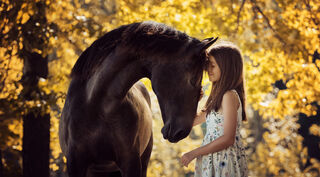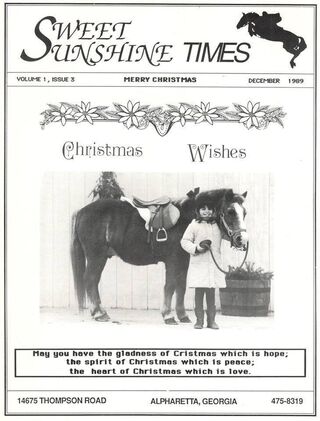
Relationships
Why Some Girls and Women Love Horses So Much
Training a horse and a partner require similar skills.
Posted December 6, 2020 Reviewed by Lybi Ma

Like so many little girls, I was absolutely obsessed with horses. My grandfather's family bred horses and he put me on a horse for the first time when I was just three years old. For many years, when I wasn't hanging around with horses, I was watching horse cartoons, playing with horse figurines and drawing horses.
This isn't at all unusual in recent times. Before the last couple of decades, the majority of horses were owned and used by men, to compete and make money, in forests, on farms and at events. But, when I was growing up, at every stable and equestrian event, men were the minority. In most areas that have anything to do with horses, women are much more common than men. In both the USA and Great Britain, over 90% of horse owners are women. Three out of 4 students enrolled in riding schools in Europe are women. The first woman to be an horse veterinarian wasn't until 1957 and now 4 out of 5 of equine veterinary graduates are women.
One question people have asked me many times, as an evolutionary psychologist interested in human-animal relationships is why are women and girls so into horses?
Are women just into fast or large forms of transportation? No. Women represent the minority of motorcycle drivers (20%) and truck owners. Are women more into animals generally? Yes, 85% of dog trainers are women. As I wrote in a recent article, "Women are much more likely to be involved in animal protection and animal advocacy, much more likely to be vegetarian, more likely to hoard animals and much less likely to hunt or engage in direct animal abuse".
Few other occupational areas have experienced such a dramatic shift from men to women as veterinary medicine and other areas to do with animals. A social constructionist or discrimination hypothesis about why women have come to equal or exceed representation in veterinary medicine and dog training but not in engineering, race car driving or surgery might indicate that these fields have become less sexist over time. My view is that there are real sex differences in basic interests between men and women often reflecting largely biological sex differences. When significant societal barriers come down we should expect that women will be overrepresented in areas that appeal to more feminine interests.
Why are women so much more into keeping and caring for horses than men are? We tend to be intrinsically reinforced to take on hobbies, interests or play that helps us practice skills that are adaptive in some way. With horses, women are practicing the same skills they use to train their boyfriends and children.

Let's start with girls and sex differences in play. There are good evolutionary reasons for play—you can't come into the world with all the knowledge you need—play helps young animals, including humans, practice the skills they will use as adults. The pleasure of play, the obsession with thinking about how to engage with the people, objects or animals involved all come together to improve the thinking and skills involved. Children play at fighting, having grown up relationships, and taking care of babies. But, girls and boys have relatively different play interests because they have different strengths and strategies when it comes to influencing others.
Men are physically much stronger than women and have other physical differences that may indicate they are adaptations for physical aggression. One of the main ways that men have power and influence is in direct physical strength. This is one reason that boys, and even male monkeys, are much more focused on rough and tumble play—this play is a great way to practice fighting. When boys are interested in indirect means of speed and strength, they tend to have a greater interest using their comparatively better spatial cognition; they're relatively more interested in rockets, trains and other mechanical toys than girls are.

For women, the main source of influence comes from psychologically influencing others. Both men and women can benefit from having strong allies. But for women, men represented one of the biggest threats to their well-being throughout evolutionary history. Women could often not directly defend themselves because they tend to be smaller and less formidable than men. What's the best defense against potentially violent men? A man. Even now, women who feel threatened are motivated to have strong male friends and formidable romantic partners—both of which require psychological influence.
Horses are a superstimulus for the dynamic of acquiring strength through influence. They're big, strong and fast but also aloof and challenging to train. Anecdotally women and men may train horses differently "women have to handle horses with their brains because they intuitively recognize that strength is not likely going to work for them". Taming a wild horse with patience and attention is called "gentling". Gentling is literally harnessing the power of a formidable animal not with physical strength of your own or punishment but with superior training skills. Skills like nonverbal communication and understanding what rewards and punishes horses are the same skills women use to influence their romantic partners and to train their children.
Myths, legends and folk tales often feature close human-animal relationships that provide special gifts. Although these stories commonly feature boys and men as well as women and girls (consider Bellerophon and Pegasus), there are many prominent examples of women who achieve power through animals. One popular modern example is Daenarys who communicates telepathically with Drogon, a powerful dragon she regards as her child. Witches have familiars, animals like cats or birds that help them with magic. In myths and legends, it seems more common for women than men to be married to animals. Stories like these are an extension of the idea that one of women's major psychological strengths is understanding and harnessing the psychology of others; that they have the motivation and skill to build influence even with minds that are very different from their own.
Horses aren't like dogs or even most house cats. Most horses aren't cuddly or eager for contact. But women develop loving and even romantic feelings towards horses—because the connection with the horse is how a woman's psychological gifts enable her to gain beauty, grace, swiftness and strength. Novelist Jane Smiley puts the feeling of riding a horse beautifully when she talks about her horse, Tick Tock: "What’s unique about riding is that the horse is always right there, and not only physically: Tick Tock’s personality, his intentions, and his willingness were always palpable. I learned why “out riding alone” is an oxymoron: An equestrian is never alone, is always sensing the other being, the mysterious but also understandable living being that is the horse."
Facebook image: Alla-Berlezova/Shutterstock



